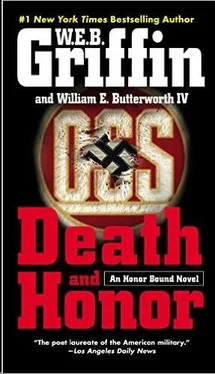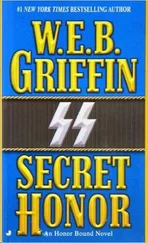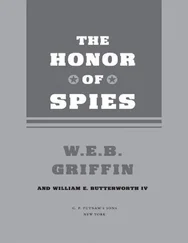Griffin W.E.B. - Honor Bound 04 - Death and Honor
Здесь есть возможность читать онлайн «Griffin W.E.B. - Honor Bound 04 - Death and Honor» весь текст электронной книги совершенно бесплатно (целиком полную версию без сокращений). В некоторых случаях можно слушать аудио, скачать через торрент в формате fb2 и присутствует краткое содержание. Год выпуска: 2009, Издательство: Penguin USA, Inc., Жанр: Старинная литература, на английском языке. Описание произведения, (предисловие) а так же отзывы посетителей доступны на портале библиотеки ЛибКат.
- Название:Honor Bound 04 - Death and Honor
- Автор:
- Издательство:Penguin USA, Inc.
- Жанр:
- Год:2009
- ISBN:нет данных
- Рейтинг книги:4 / 5. Голосов: 1
-
Избранное:Добавить в избранное
- Отзывы:
-
Ваша оценка:
- 80
- 1
- 2
- 3
- 4
- 5
Honor Bound 04 - Death and Honor: краткое содержание, описание и аннотация
Предлагаем к чтению аннотацию, описание, краткое содержание или предисловие (зависит от того, что написал сам автор книги «Honor Bound 04 - Death and Honor»). Если вы не нашли необходимую информацию о книге — напишите в комментариях, мы постараемся отыскать её.
Honor Bound 04 - Death and Honor — читать онлайн бесплатно полную книгу (весь текст) целиком
Ниже представлен текст книги, разбитый по страницам. Система сохранения места последней прочитанной страницы, позволяет с удобством читать онлайн бесплатно книгу «Honor Bound 04 - Death and Honor», без необходимости каждый раз заново искать на чём Вы остановились. Поставьте закладку, и сможете в любой момент перейти на страницу, на которой закончили чтение.
Интервал:
Закладка:
The war had actually come to Uruguay and Argentina in December 1939. The pocket battleship Graf Spee —the pride of the German navy, named after a World War I naval hero, Admiral Graf (Count) Maximilian von Spee—had sailed from Wilhelmshafen on 21 August 1939, with orders to head for the South Atlantic and there to interdict Allied shipping heading for England.
Wool, leather, and—especially—meat and other foodstuffs from Argentina and Uruguay had been of enormous value to the British in World War I, and the Germans were determined to shut off that supply in this war. The British were equally determined to keep the supply lines open, and dispatched the cruisers HMS Ajax, HMS Achilles, and HMS Exeter to find the Graf Spee and sink her.
They found the German ship off the coast of Uruguay, close enough to shore so that the roar and concussion of the naval cannon caused the sea lions on the rocks near Punta del Este to leap to their deaths.
The Graf Spee suffered serious damage but managed to limp up the River Plate into the harbor at Montevideo. International law required that a warship of a belligerent power could claim the protection of a neutral harbor for only seventy-two hours.
The captain of the Graf Spee, Hans Langsdorff, one of the most respected officers in the German navy, radioed Berlin explaining his plight: There was serious damage to the Graf Spee that could not be repaired in the time he had. He had lost more than one hundred sailors in the battle off Punta del Este, and had as many more seriously wounded crewmen who required immediate treatment not available on the Graf Spee, whose onboard hospital had been destroyed in the sea battle.
And there were three British cruisers waiting for him in the South Atlantic Ocean.
Under these circumstances, he could see no alternative to letting the seventy-two hours run out, then allow himself and his ship to be interned by the Uruguayan government.
The reply from Grand Admiral Eric Raeder, commander in chief of the German navy, came immediately: Loss of life was not a consideration when the honor of Germany and the German navy was at stake. The Führer, Adolf Hitler, ordered that the Graf Spee go down fighting.
Captain Langsdorff understood honor.
Thus, he arranged for his wounded to be taken ashore and interned so they would receive medical attention. He put his dead ashore and arranged for their burial in Montevideo. He arranged for most of his physically fit crew to board small vessels hastily sent from Buenos Aires by Argentine Axis sympathizers. On arrival, they would be interned.
When the seventy-two hours was almost up, he hoisted anchor and sailed the Graf Spee out of Montevideo’s harbor. When she was far enough into the River Plate so that her wreck would not interfere with shipping, he scuttled her. He made sure he was the last man to leave her, then took her battle ensign, boarded a small vessel, and made for Buenos Aires.
In Buenos Aires two days later, after ensuring that his officers and men would be treated well in internment, Captain Langsdorff put on his dress uniform, positioned himself so that his body would fall on the Graf Spee ’s battle ensign, and shot himself in the temple. That, he believed, would prove he had scuttled his ship because he saw that as his duty as an honorable officer, not because he was afraid of losing his life.
Captain Langsdorff was buried by the Argentine military with full military honors in Buenos Aires’s North Cemetery. Most of his crew, in dress uniform, attended. His pallbearers were Graf Spee seamen. They then marched off into internment.
Vice Admiral Wilhelm Canaris, the senior German intelligence officer, who in World War I had been interned in—and escaped from—Argentina, immediately dispatched German intelligence officers to Buenos Aires to arrange for escape of the interned crew of the Graf Spee.
With the Graf Spee gone, there was no longer a chance for the Germans to shut off the supply of matériel to the British using a sea raider or other surface navy warships. German Admiral Erich Raeder turned to submarines. Because of the distance from the submarine pens in France, this was an enormously difficult task.
Neutral Uruguay was sympathetic to the British chiefly because of a large English colony and the enormously popular Brit ambassador, Sir Eugene Millington-Drake. But neutral Argentina was predominantly—though by no means entirely— pro-Axis.
The Argentine army was armed with Mauser rifles, wore German helmets, sent their senior officers to the Kriegschule in Germany, and had their headquarters in a handsome, enormous building—the Edificio Libertador—built by the Germans as a manifestation of their solidarity with the Argentines.
Its navy, however, largely British- and (to some degree) U.S.-trained, was sympathetic to England.
Moreover, there was a large Jewish colony in Argentina—including forty thousand Jewish gauchos—that was by no means sympathetic to Hitler, and there were large numbers of other European refugees who were decidedly anti-Axis.
The practical result of all this was that while pro-Axis Argentines did their best to see that German submarines not only managed to get fuel and supplies but were advised of departing British merchant ships so they could be intercepted and sunk, there were anti-Axis Argentines who did their best to keep the supplies flowing to England.
Things changed soon after the Japanese attack on the United States at Pearl Harbor. Brazil declared war on the German-Italian-Japanese axis in January 1942. That gave the U.S. Army Air Corps immediate access to Brazilian airfields, and the U.S. Navy to Brazilian ports and fuel.
B-24 bombers were soon prowling the South Atlantic just outside the Argentine and Uruguayan territorial limits. These aircraft had most of their machine-gun turrets removed—to increase range by reducing weight and drag—and their bomb bays loaded with special antisubmarine bombs.
This was not entirely a heartwarming manifestation of Brazilian-U.S. cooperation to fight a common enemy. American intelligence agents reported their strong suspicions that the artillery, tanks, and ammunition requested by Brazil of the “Arsenal of Democracy” were as likely to be used by the Brazilians against the Argentines as they were against the Axis.
A war between Argentina and Brazil, the two largest countries on the South American continent, was not going to contribute much to a war against Germany, Italy, and Japan. The flood of supplies to Brazil dwindled to a trickle.
And then American intelligence agents in Europe began to hear whispers of two secret German operations, which sometimes overlapped.
One was that it was possible for German Jews outside Germany to purchase the freedom of their relatives from Nazi concentration/extermination camps, followed by transport to Argentina and Uruguay.
The second secret German plan, called Operation Phoenix, was to establish in Argentina, Brazil, and Paraguay safe havens for senior Nazi officials—possibly including Hitler himself—to which they could flee when the Thousand-Year Reich went down to defeat.
The overlap between the two plans, intelligence officers reported, was that Operation Phoenix would be funded at least partially—and possibly substantially— by the ransom paid to get Jews out of Nazi death camps.
In something of an understatement, United States intelligence activities in neutral Argentina increased considerably about the time of the Soviet victory at Stalingrad and the second battle of Kasserine Pass.
Читать дальшеИнтервал:
Закладка:
Похожие книги на «Honor Bound 04 - Death and Honor»
Представляем Вашему вниманию похожие книги на «Honor Bound 04 - Death and Honor» списком для выбора. Мы отобрали схожую по названию и смыслу литературу в надежде предоставить читателям больше вариантов отыскать новые, интересные, ещё непрочитанные произведения.
Обсуждение, отзывы о книге «Honor Bound 04 - Death and Honor» и просто собственные мнения читателей. Оставьте ваши комментарии, напишите, что Вы думаете о произведении, его смысле или главных героях. Укажите что конкретно понравилось, а что нет, и почему Вы так считаете.












